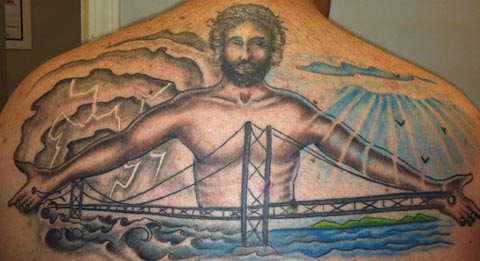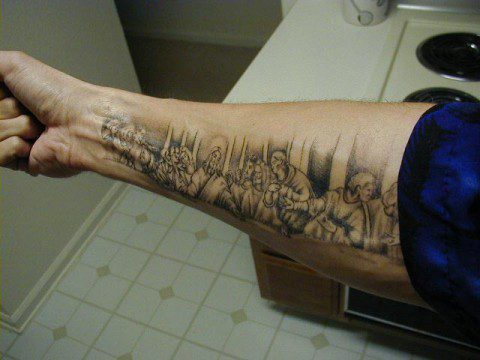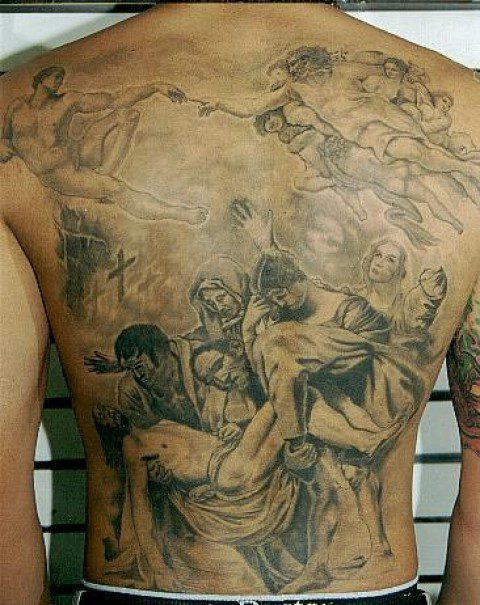“A Michigan pastor who says he’s doing everything he can to reach out to people who don’t feel comfortable at a traditional house of worship has opened a tattoo parlor inside his church,” reports Businessweek magazine.
Pastor Steve Bentley's tattoo
But tattoos? What’s next, mixed martial arts? Professional wrestling exhibitions? Actually, the Bridge church has already offered both. It seems the Rev. Steve Bentley says his ministry is built on his conviction that mainstream Christian evangelism has become ineffective and irrelevant to most folks.
Toward that end, he hired Tattoo artists Ryan Brown and Drew Blaisdell and opened Serenity Tattoo inside the 30,000 square feet that the 500-member church owns at Flint Township’s Carman Plaza shopping center.
“Just down the hall from the Rev. Steve Bentley’s office and around the corner from the galvanized watering trough used for baptisms,” reports the Mlive news website. There the tattoo artists ply “their trade by appointment or from noon until 8 p.m., Monday-Saturday.
And one of their best customers is the parson. His back is a Christian mural.
But what about Leviticus 19:28, which plainly says, “You shall not make any cuts in your body for the dead nor make any tattoo marks on yourselves.” That would seem pretty straightforward.
Yeah, counters Bentley, but what about Isaiah 44:5, which proclaims in part: “This one will say, ‘I am the Lord’s’ and … another will write on
Leonardo da Vinci's "Last Supper"
And there’s always Revelation 3:12: “He who overcomes, I will make him a pillar in the temple of My God … and I will write on him the name of my God, and the name of the city of my God, the new Jerusalem.”
Bentley says the context of the Leviticus prohibition is a list of pagan practices the ancient Israelites were to shun. Godly tattoos praising the Lord are allowed.
Even so, Bentley understands some don’t like the idea of a tattoo shop inside the church. And that’s what the Bridge is all about.
“We are about doing church in a different way and being relevant to people,” Bentley told the Flint Journal newspaper. “You can get a tattoo in a clean environment. You can do it while still sticking to your moral code.”
Tattooist Brown is a recovering alcoholic who says the atmosphere inside the church building has helped keep him focused and on the right path.
“I was running my own studio. There wasn’t much purpose in it,” he said. “I was insane for five years. To sum it up, my problem was self-control. My brain couldn’t come up with an alternative where Christ wasn’t the only thing that could save me. I was somebody who needed to be saved from hopelessness in body, mind and spirit.”
Furthermore, he had a substance abuse problem. “I was struggling with whether I could keep my studio” and stay sober. “I prayed a lot and decided the best thing was to close it and come to the church. I figured I could have a lot more positive impact” there.
Fortunately the Rev. Bentley teaches Christians are free to tattoo their bodies since he believes New Testament believers are not bound by the Old Testament laws to gain a right relationship with God. The Bridge actually teaches that if Christians obey laws of the Old Testament, they must also be bound by Jewish rules restrict eating shellfish or pork, trimming one’s beard, or grilling cheeseburgers. Indeed, the Apostle Paul writes that the Old Testament Law was designed by God was to lead people toward Jesus.
“Therefore the Law has become our tutor to lead us to Christ, so that
Michaelangelo's Sistene Chapel ... in skin art
The Bridge hosts Alcoholics Anonymous and Narcotics Anonymous chapters and even offers a “celebrate recovery” church service from 6-9 p.m. on Saturdays as well as traditional 11 a.m. and 5 p.m. services on Sundays.
Tattooist Blaisdell says the Bridge was the kind of fellowship he needed. “I was at an AA meeting in Flushing. I was at the end of my rope,” Blaisdell said. “It was almost like a miracle. I used to be a non-believer. I hit bottom and I grabbed onto the church. I was an atheist who just didn’t care about anything. The appealing thing to me is, I’m dealing with so many people who are recovery based. It’s kind of brought us all together.”
Today he and Brown refuse requests for tattoos that glorify drugs, gangs or Satan.
That’s the kind of testimony Bentley likes to hear. The Flint native dropped out of high school, but got his GED high school equivalency and put himself through college by working as an auto mechanic.
He graduated with a degree in theology from Olivet Nazarene University in Illinois and ordained in 1999. He earned a master’s degree in 2006 from American Intercontinental University.
Bentley says it doesn’t bother him that other churches would shun some of the things the Bridge does.
Bentley told Mark Hensch at the Christian Post news website the only thing that matters is leading people to glorify God. “Love God, love others, disciple all. We try to make sure everything we do encompasses that.”
Brown told Hensch he can’t believe the transformation his life has taken since joining the Bridge. A tattoo meant to read “hopeless” across his knuckles, for example, now reads “hope” and “love.” The artist admitted that it’s no longer just a tattoo – it’s a mark honoring Christ’s profound love.
“After accepting Christ, this church gave me a place to grow. It’s a positive environment where people aren’t looked down on,” he said. "By having a tattoo shop here, it’s a daily testimony to how somebody can be changed by God.”




